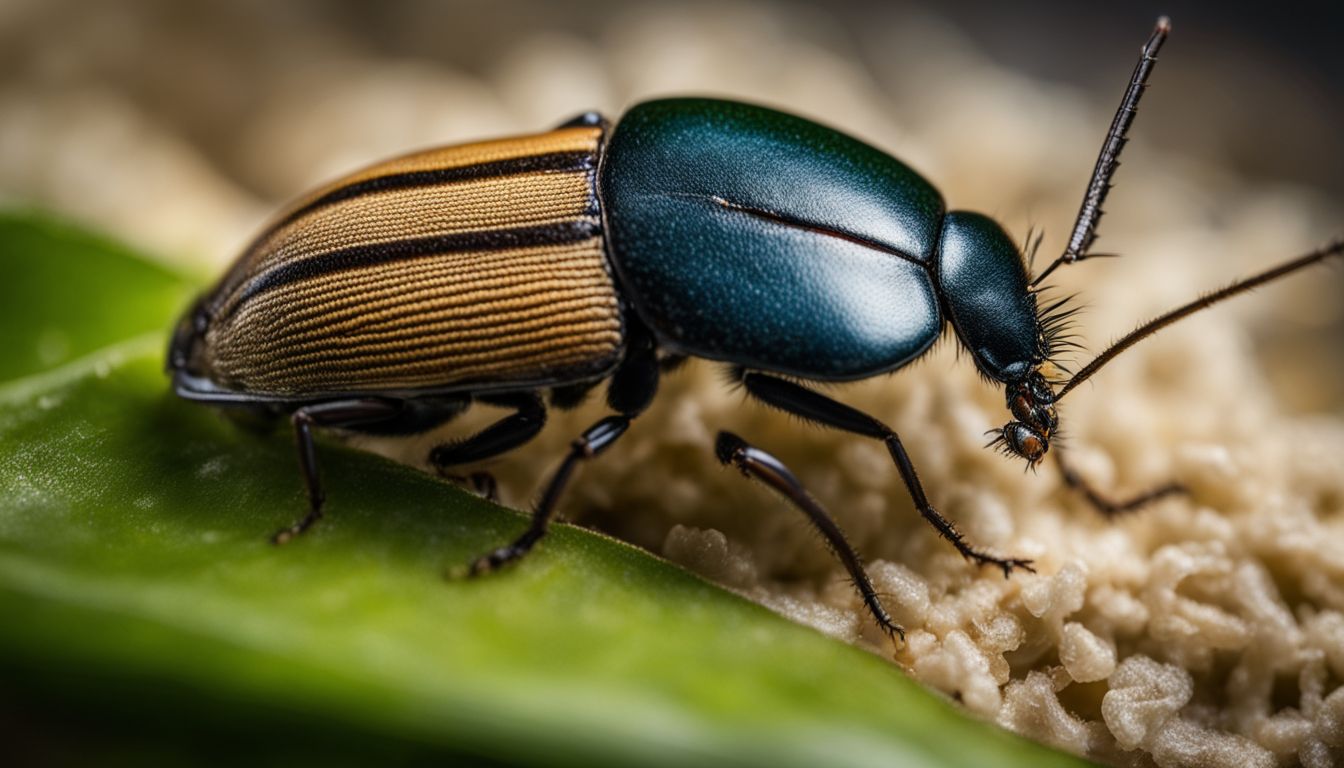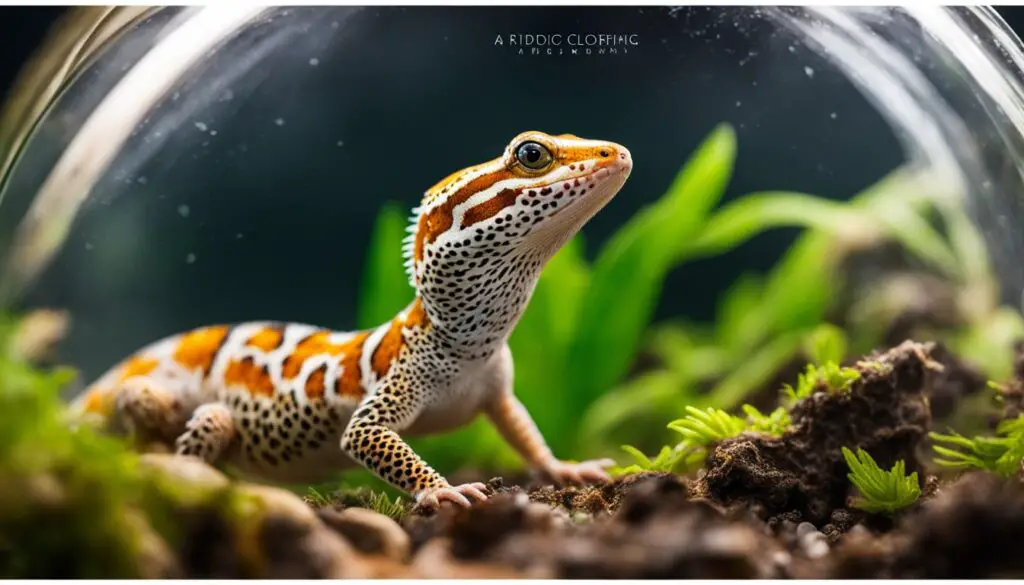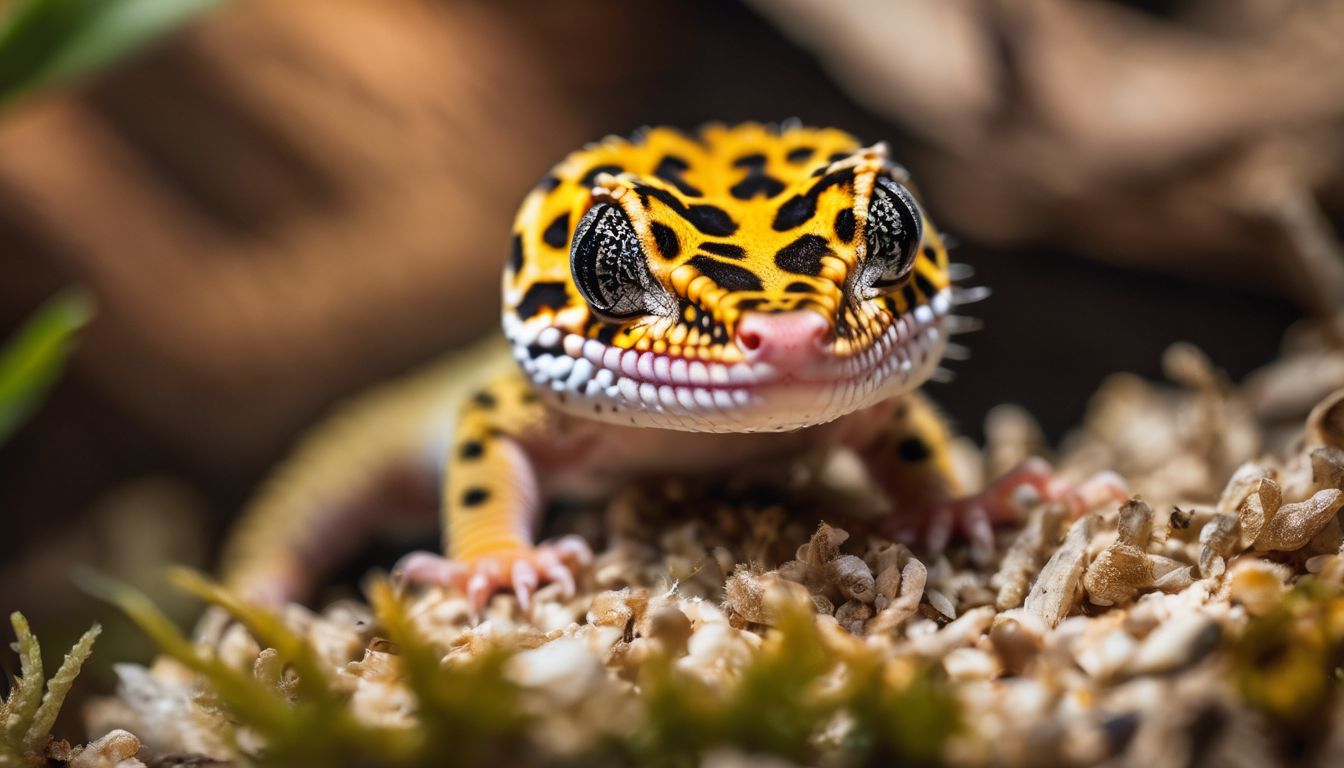Are you a proud gecko owner looking for the best snacks to keep your scaly friend happy and healthy? You may have heard mealworm beetles buzzing on the menu, but is it safe to let your gecko feast on these critters? It’s a common question among reptile enthusiasts seeking variety in their pet’s diet.
Mealworm beetles offer plenty of protein which is vital for your gecko’s growth and wellbeing.
This blog post will dive into whether these beetles are a good fit for your gecko’s meal plan. We’ll explore everything from the beetle’s life cycle to how they match up with different kinds of geckos.
Plus, we’ve got tips on serving sizes and setting up your very own beetle buffet at home! Your curiosity about adding some crunch to your lizard buddy’s lunches is about to be satisfied.
Let’s get started – discovery awaits!
Key Takeaways
- Mealworm beetles offer a rich source of protein and essential nutrients for geckos, supporting their growth, development, and overall health.
- It’s safe to feed mealworm beetles to leopard geckos as part of a varied diet; however, moderation is key due to the tough chitin in the beetle’s exoskeleton.
- Understanding the nutritional benefits at different stages of a gecko’s life helps in providing a well-balanced diet that meets their specific needs.
- Starting and maintaining a mealworm beetle colony can create a sustainable food source for geckos, ensuring consistent nutrition without the need for frequent purchases.
Understanding the Mealworm Beetle Lifecycle

The Mealworm Beetle lifecycle consists of a transition from larva to beetle, with nutritional changes occurring throughout. It’s important for gecko owners to understand this lifecycle when considering feeding Mealworm Beetles to their pets.
The transition from larva to beetle
Mealworms start as tiny eggs before becoming larvae, which look like little worms. As they grow, these larvae shed their skin several times. After some time, they change into a pupa—this is when things get exciting! Inside the pupa, the mealworm transforms into a beetle.
This process is called metamorphosis. Beetles have hard shells and can move around easily.
Now let’s talk about what happens to mealworm beetles as they grow up and how it affects what they offer to your gecko friend in terms of food goodness.
Nutritional changes during the lifecycle
As mealworms grow into beetles, their bodies change a lot. These changes also affect what they can give to your gecko as food. Mealworm beetles pack more protein than when they were just larva.
This extra protein helps your gecko build strong muscles. But be careful, because the hard shell of the beetle is tough to digest and could cause some issues if eaten too much. Geckos need different nutrients at each stage of life, and mealworm beetles offer some good stuff for them.
For young geckos growing fast or adults needing extra energy, having beetles in their meals can be very helpful. They are full of good things that keep a gecko healthy and happy. Some owners find that adding these insects to the mix makes feeding times fun for their reptile pals since it lets them hunt like in the wild!
Compatibility of Mealworm Beetles with Geckos

Can Leopard Geckos safely consume Mealworm Beetles?
Leopard geckos can definitely eat mealworm beetles. These little insects are full of protein and provide good nutrition for your pet. However, the hard shell of the beetles has chitin in it, which might be tough for geckos to digest if they eat too many.
It’s safe to let leopard geckos hunt and munch on these bugs as part of a varied diet. Just keep an eye on them while eating to ensure they handle their beetle snack well. And don’t leave uneaten beetles in the tank; they could nibble on your gecko’s toes or cause stress.
Risks and considerations for feeding beetles to geckos
Feeding mealworm beetles to geckos can have some risks and considerations. One important consideration is that the exoskeleton of mealworm beetles contains chitin, which might bother geckos or irritate their stomachs if eaten in large amounts.
Also, uneaten insects should be monitored to prevent harm to the gecko. Similarly, while most geckos enjoy hunting and consuming mealworm beetles as part of a varied diet, there’s a possibility for the beetle’s nibbling behavior to irk or injure the gecko.
To maintain a well-balanced feeding routine for your pet, it’s crucial to remember that although mealworm beetles are generally safe for consumption by geckos and can provide essential nutrients like protein, they should be given in moderation.
Moreover, when offering mealworm beetles as food for your pet gecko, ensure they aren’t oversized or underfed; appropriate sizing and quantities are key in maintaining their health through an insect-rich diet.
Lastly, keep an eye on how your gecko reacts when being offered these insects – this will help you understand what works best for them.
Benefits of Including Mealworm Beetles in a Gecko Diet
– Mealworm beetles are a rich source of protein and essential nutrients for geckos, aiding in their overall growth and development.
– Their high calcium content also contributes to the maintenance of strong bones and healthy egg production in female geckos.
Nutritional value for different stages of gecko growth
Mealworm beetles are a valuable source of protein, which is crucial for the growth and development of geckos. The high protein content in mealworm beetles provides essential nutrients that aid in strengthening bones and muscles as geckos mature.
For young geckos, mealworm beetles offer vital energy to support their rapid growth during this stage. As geckos advance into adulthood, the protein from mealworm beetles helps to maintain their overall health and vitality.
Understanding the nutritional benefits of mealworm beetles at different stages of a gecko’s life is key to ensuring their well-being throughout their growth journey. Incorporating these nutrient-rich insects can significantly contribute to a balanced diet for your beloved pet.
Feeding Mealworm Beetles to Your Gecko
Offer Mealworm Beetles to your gecko by placing them in a shallow dish or releasing them one at a time, making sure they are an appropriate size for your gecko’s age and size. To learn more about proper feeding techniques and considerations, keep reading our comprehensive guide for gecko owners.
How to properly offer Mealworm Beetles to geckos
When offering mealworm beetles to geckos, it is important to ensure that the beetles are an appropriate size for your gecko. Monitor how many mealworm beetles your gecko can eat in about fifteen minutes and adjust the quantity accordingly.
It’s essential to remove any uneaten insects to prevent them from causing harm. Additionally, as a treat, you should only give crested geckos mealworms in moderation, not as a staple part of their diet.
Always keep an eye on your gecko after feeding them with mealworm beetles; this will help ensure that they don’t encounter any irritation from the insects’ exoskeleton.
Determining the appropriate size and quantity
When determining the right size and amount of mealworm beetles to feed your gecko, consider the gecko’s size and age. Generally, you should select smaller beetles for younger geckos and larger ones for adult geckos.
As a rule of thumb, offer insects that are no wider than the space between your gecko’s eyes to prevent choking hazards. Start by offering a few beetles at a time to gauge your gecko’s appetite before gradually increasing the quantity.
Monitoring their response will help you determine the appropriate number of mealworm beetles to maintain a balanced diet for your pet.
Starting and Maintaining a Mealworm Beetle Colony
Create a sustainable food source for your gecko by following our step-by-step guide to starting and maintaining a mealworm beetle colony. Learn how to provide a nutritious and abundant supply of beetles for your pet’s diet.
Read More!
Step-by-step guide to creating a sustainable food source
To create a sustainable food source for your gecko, consider starting a mealworm beetle colony. This can provide a continuous and nutritious food supply for your pet. Here’s how to do it:
- Obtain a plastic container with a secure lid to house the beetles.
- Add a layer of substrate, such as oatmeal or wheat bran, to the container for the beetles to burrow and lay eggs.
- Provide small pieces of fruits and vegetables, like carrots or apple slices, as food and moisture for the beetles.
- Ensure the container is kept at room temperature and away from direct sunlight.
- Regularly check for eggs and transfer them to a separate container to hatch into larvae.
Frequently Asked Questions About Geckos and Mealworm Beetles
Do geckos enjoy eating mealworm beetles? What are some common concerns about feeding beetles to geckos? Find the answers to these questions and more in this section.
Addressing common concerns and misconceptions
Some gecko owners worry about mealworm beetles irritating their pets’ digestive system. But the truth is, while the exoskeleton of mealworm beetles contains chitin, it doesn’t pose a significant risk to geckos.
However, it’s essential to monitor uneaten insects or worms to prevent any harm. Also, some people fear that giving mealworm beetles might lead to overfeeding and obesity in their geckos; however, when offered in moderation and as part of a varied diet, they can be beneficial for your pet’s nutritional needs.
It’s worth noting that introducing new food items should always be done gradually and carefully observed for any adverse reactions. Many keepers also express concerns about whether feeding insects like mealworm beetles could enliven or stress out their geckos.
The truth is that offering live prey plays an essential role in enriching the gecko’s environment by encouraging natural hunting behaviors and providing mental stimulation. As long as you provide appropriate husbandry conditions and practice responsible feeding, these concerns are generally unfounded.
Can Leopard Geckos see in the dark??
Leopard geckos have excellent night vision and can see in the dark. Their eyes are adapted to low light conditions, making them adept hunters during nighttime. This ability allows them to locate and capture their prey efficiently, such as mealworm beetles, without relying on bright lighting.
Now let’s delve into understanding the Mealworm Beetle Lifecycle.
Conclusion
In summary, geckos can eat mealworm beetles and benefit from their nutritional value. Feeding mealworm beetles to your gecko is practical and can provide a source of stimulation. It’s important to monitor uneaten insects to prevent harm to the gecko.
By offering this varied diet, gecko owners can ensure the health and well-being of their pets. Encouraging natural behaviors through feeding strategies enhances the overall quality of care for these insectivorous reptiles.
Find out more about your gecko’s nighttime behavior by exploring whether leopard geckos can see in the dark.
FAQs
1. Can geckos eat mealworm beetles?
Yes, geckos can eat mealworm beetles as part of their diet, and they provide a good source of protein for them.
2. How often should I feed my gecko mealworm beetles?
Mealworm beetles can be offered as an occasional treat in addition to the regular staple diet of insects such as crickets or roaches.
3. Are there any risks in feeding mealworm beetles to geckos?
Feeding too many mealworms or beetles may lead to nutritional imbalance, so it’s important to vary your gecko’s diet with other insects and supplements.
4. How do I prepare mealworm beetles before feeding them to my gecko?
Before offering the mealworm beetles to your gecko, make sure they are gut-loaded with nutritious food and dusted with calcium powder for added nutrition.
5. What if my gecko refuses to eat mealworm beetles?
If your gecko refuses to eat the mealworm beetle, it’s best not to force-feed them. Instead, offer other appropriate insects or consult a reptile veterinarian if the refusal persists.




